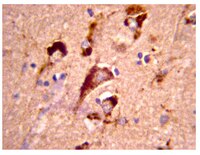15-205 Sigma-AldrichAmyloid Beta Precursor Proteins Explorer Antibody MiniPack
This Antibody pack contains Anti-Alzheimer Precursor Protein A4, Anti-Alzheimer Precursor Protein, APP 643-695 C-terminal, Anti-Amyloid Precursor Protein, C-terminus.
More>> This Antibody pack contains Anti-Alzheimer Precursor Protein A4, Anti-Alzheimer Precursor Protein, APP 643-695 C-terminal, Anti-Amyloid Precursor Protein, C-terminus. Less<<Recommended Products
Overview
| Replacement Information |
|---|
| References |
|---|
| Product Information | |
|---|---|
| Components |
|
| Presentation | 3 individual tubes containing either Anti-Amyloid Precursor Protein, C-terminus; Anti-Alzheimer Precursor Protein, APP 643-695 C-terminal fragment, Clone 2.F2.19B4; or Anti-Alzheimer Precursor Protein A4, clone 22C11 |
| Properties | Each vial is 30% the size of the parent catalog number |
| Quality Level | MQ100 |
| Applications | |
|---|---|
| Application | This Antibody pack contains Anti-Alzheimer Precursor Protein A4, Anti-Alzheimer Precursor Protein, APP 643-695 C-terminal, Anti-Amyloid Precursor Protein, C-terminus. |
| Physicochemical Information |
|---|
| Dimensions |
|---|
| Materials Information |
|---|
| Toxicological Information |
|---|
| Safety Information according to GHS |
|---|
| Safety Information |
|---|
| Storage and Shipping Information |
|---|
| Packaging Information | |
|---|---|
| Material Size | 3 vials/Pk |
| Transport Information |
|---|
| Supplemental Information |
|---|
| Specifications |
|---|
| Global Trade Item Number | |
|---|---|
| Catalogue Number | GTIN |
| 15-205 | 04053252005350 |










